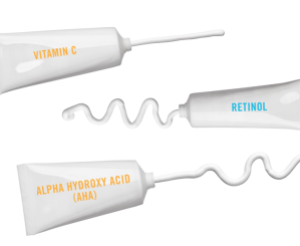Fact vs. Fiction: Using Multiple Skincare Ingredients Together Creates Better Results
 FICTION. Mixology may be a fun way to find your signature cocktail, but combining too many different skincare products is not likely to produce the results you’re after. Plus, if you’re not careful, product mixing can actually aggravate, rather than improve, your skin.
FICTION. Mixology may be a fun way to find your signature cocktail, but combining too many different skincare products is not likely to produce the results you’re after. Plus, if you’re not careful, product mixing can actually aggravate, rather than improve, your skin.
What’s the trick to multi-product success? Start by familiarizing yourself with the active and cosmetic ingredients in your skincare routine so you can recognize (and avoid) the most common mixology problems:
1) A lose-lose situation. Sometimes the ingredients in different products counteract each other, which means you won’t see the intended benefits of either product on your skin (for example, alpha hydroxy acids cancel the benefits of vitamin C-based products).
2) Tandem irritation strikes. In other words, your skin is fine when the products are used independently, but use them together, and hello skin irritation. This is common when combining multiple products with anti-aging benefits (think: retinol and alpha hydroxy acids).
3) Beware of product incompatibility. This is easy to test for by rubbing your face after the second product has dried. If it peels, balls, or curdles, you’re looking at products that don’t mix.
These ingredients simply don’t play nice with each other:
Retinol.* This derivative of vitamin A is a must-have when it comes to visibly improving skin texture and minimizing the appearance of pores. However, dryness, redness or irritation can result from mixing retinol with glycolic acids, alpha hydroxy acids (in many wrinkle-minimizing products), or salicylic acids (in acne treatments). It’s no surprise then, retinol and the acne-fighting ingredient benzoyl peroxide actually deactivate each other.
Citric acid. Commonly found in moisturizers, this effective ingredient is destined to be a loner. Citric acid often causes irritation if layered with other products.
Alpha hydroxy acids (AHA) and vitamin C. These acid-based ingredients actually destabilize each other, leaving the antioxidants ineffective, so choose products with one or the other—but don’t combine them or you risk redness, peeling and irritation. Also, steer clear of retinol if you’re using either of these acids.
Word to the skin-wise: Get to know the ingredients that work in harmony with your skin (and with each other)—but leave the mixology to dermatologists. Stick to a collection of products clinically designed to work together, and your skin will thank you.



